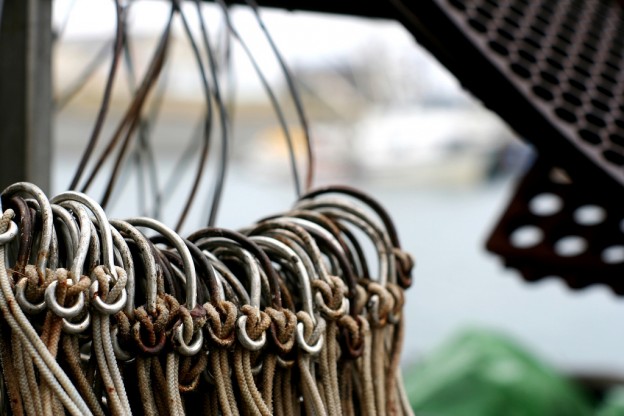
Photo: izik/Flickr
Fish. We’re encouraged to eat more of it. We’re encouraged to eat local. Heck, we’ve even been warned that if any imported food is going to make us sick, it’s likely to be seafood. Still, over 75% of the fish Americans consume comes from abroad.
Now, a high-profile grocery chain — Whole Foods –has announced it will no longer carry seafood from New England waters unless it’s caught in what Whole Foods considers a sustainable manner. This means no more gray sole, no more skate, and Atlantic cod only if brought in by gillnets or hook and line.
The new policy reported in Sunday’s New York Times is controversial, not the least with some of our region’s fishermen struggling to turn a profit in a difficult industry. US Senator Scott Brown has also weighed in.
So, where does it all leave us, the consumer? Whose opinions should we trust? Where does it leave our region’s fishermen and the health of our local fishing industry? And what about the health, in numbers, of New England’s prized fish stocks?
Some of these questions will be answered this Sunday — or at least grappled with in a substantive way — at the New England Sustainable Seafood Teach-In organized by locally-based Let’s Talk About Food. Collaborators are the New England Aquarium, the Center for Health and the Global Environment at Harvard Medical School, the Museum of Science, Chefs Collaborative and the Cambridge Science Festival. Notably, Whole Foods is one of the event sponsors.
Public Radio Kitchen will be present on Sunday to report on the Teach-In. But we’re also anticipating the tangle of issues which undoubtedly will be raised during the panel discussions and keynote speeches.
Today, we publish a series of questions posed to Roger Berkowitz, President and CEO of Legal Sea Foods, who will participate on one of Sunday’s panels. Legal’s is an institution here in the Boston area (“If it isn’t fresh, it isn’t Legal!”), and growing gangbusters along the East Coast. It’s a restaurant business and a fish company. What does its CEO have to say about the state of New England seafood?
There are 32 Legal Sea Foods restaurants up and down the East Coast, with about half in Massachusetts alone. Who are the industry experts you listen to in deciding which fish are sustainable to buy in volume? How clear-cut are the guidelines they recommend?
We’ve been in the fish business for over 60 years and have the benefit of experience, historical perspective and direct relationships with fishermen. We pay attention to multiple sources – of course, the government, as well as fishermen, scientists, environmentalists, industry thought-leaders, etc. One of my biggest mentors is former fisherman and naturalist Dick Wheller.
How much of the seafood served to Legal customers is sourced from New England waters? By what criteria do you choose your New England vendors?
The vast majority of our seafood is from New England. We look to partner with fishermen with integrity and who employ best practices. Of course we carefully observe the condition of the fish we buy at our Quality Control Center. We do site visits and we’re fortunate to have decades of experience to rely upon.
From its inception in 1950, Legal Sea Foods has identified itself as a “fish company in the restaurant business.” What changes have you observed in the fishing industry here in New England in your 20 years as the head of Legal Sea Foods?
Many, many things have changed – among them, regulations are more imposing, fleet sizes are smaller and fish is less a commodity.
What do you see as the greatest challenges for your business in terms of buying, selling and serving New England fish over the next five years?
I believe that the greatest challenge the industry faces is ensuring that the best available science is used to assess fish stocks. Only then, when we have accurate and indisputable assessments, can appropriate regulations be put in place.
What, in your view, could be the most important take-away from this Teach-In for members of the public?
It’s a great opportunity for the public to gain a deeper appreciation for the nuances. Seafood sustainability is a complex issue and certainly not black and white.
To register for the Teach-In on Sunday, April 29, head to Let’s Talk About Food. Tickets are $10. The event begins at 1pm.

Pingback: Fishermen Fume Over Whole Food’s Sustainable Fish Move | Radio Boston
Pingback: Barton Seaver: Eating Sustainable Seafood Could Be A Form Of Patriotism | Radio Boston
Pingback: Fish Talk in the News – Friday, April 27 | Talking Fish